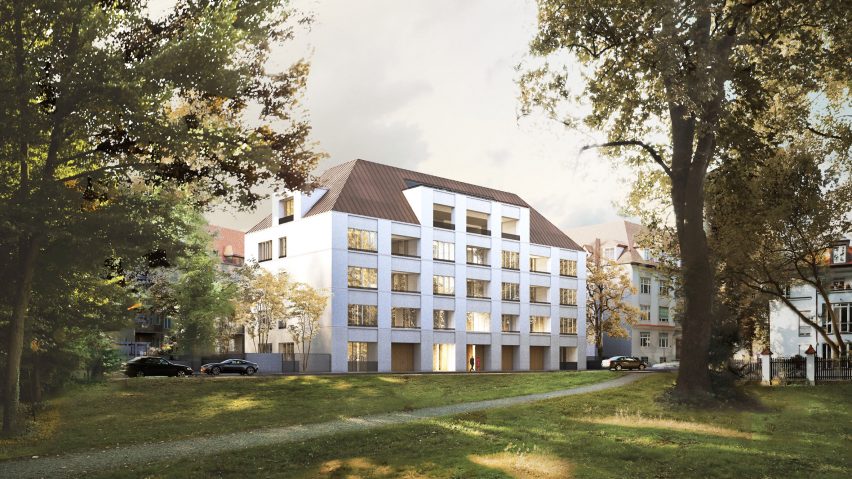David Chipperfield Architects has revealed designs for a residential development in Munich, Germany, that recalls the local 19th century architecture.
Set among the neoclassical buildings of the Kolbergerstrasse on the edge of Hertzog Park, the five-storey apartment block will include a two-storey penthouse, two three-storey apartments with their own gardens, and several one-storey apartments.
Described by developers Euroboden as a "contemporary Stadtpalais...without cloying historicism", the residential block will feature low relief pillars running vertically along the plaster facade, banded with Danube limestone.
Translating literally as "city palace", a Stadtpalais is traditionally a grand urban residence built for European nobility.
David Chipperfield Architects designed the freestanding apartment building to be sensitive to the surrounding 19th century buildings. Renders show the pale facade contrasting against a brown-coloured hipped roof, with large windows and recessed balconies.
Sitting on a 1,300-square-metre plot, the completed building will have 2,800 square metres of living space. As with the existing neoclassical buildings around the park, the detached residence will be surrounded by landscaped gardens.
Italian landscape architects Erica and Federico Ratti will plant bushes of roses, rhododendrons, and hydrangea, surrounded by a hedge screen of boxwood and yew.
Inside, Panels of natural stone and solid oak cladding in the shared two-storey entrance hall will continue the theme of contemporary grandeur. Individual apartments will have fireplaces and views out over the park.
The development is due to complete in 2020.
David Chipperfield Architects is currently engaged in building a 230-metre-high tapered skyscraper on Hamburg's riverfront. When the tower is complete it will be the tallest building in the city.
The London-based architecture practice, founded by David Chipperfield in 1985, has recently completed a new entrance for the city's Selfridge's department store, and added an extension connected by a concrete bridge to the Royal Academy of Arts.

